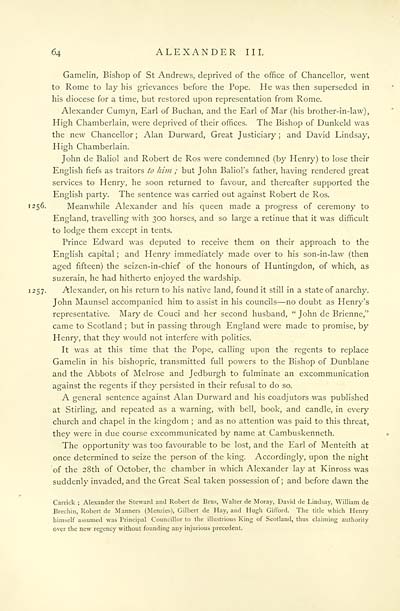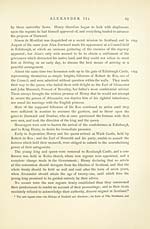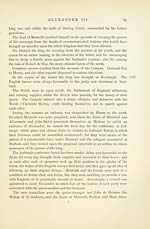Family records of the Bruces and the Cumyns
(76) Page 64
Download files
Complete book:
Individual page:
Thumbnail gallery: Grid view | List view

64 ALEXANDER III.
Gamelin, Bishop of St Andrews, deprived of the office of Chancellor, went
to Rome to lay his grievances before the Pope. He was then superseded in
his diocese for a time, but restored upon representation from Rome.
Alexander Cumyn, Earl of Buchan, and the Earl of Mar (his brother-in-law),
High Chamberlain, were deprived of their offices. The Bishop of Dunkeld was
the new Chancellor ; Alan Durward, Great Justiciary ; and David Lindsay,
High Chamberlain.
John de Baliol and Robert de Ros were condemned (by Henry) to lose their
English fiefs as traitors to him ; but John Baliol's father, having rendered great
services to Henry, he soon returned to favour, and thereafter supported the
English party. The sentence was carried out against Robert de Ros.
1256. Meanwhile Alexander and his queen made a progress of ceremony to
England, travelling with 300 horses, and so large a retinue that it was difficult
to lodge them except in tents.
Prince Edward was deputed to receive them on their approach to the
English capital ; and Henry immediately made over to his son-in-law (then
aged fifteen) the seizen-in-chief of the honours of Huntingdon, of which, as
suzerain, he had hitherto enjoyed the wardship.
1257. Alexander, on his return to his native land, found it still in a state of anarchy.
John Maunsel accompanied him to assist in his councils — no doubt as Henry's
representative. Mary de Couci and her second husband, " John de Brienne,"
came to Scotland ; but in passing through England were made to promise, by
Henry, that they would not interfere with politics.
It was at this time that the Pope, calling upon the regents to replace
Gamelin in his bishopric, transmitted full powers to the Bishop of Dunblane
and the Abbots of Melrose and Jedburgh to fulminate an excommunication
against the regents if they persisted in their refusal to do so.
A general sentence against Alan Durward and his coadjutors was published
at Stirling, and repeated as a warning, with bell, book, and candle, in every
church and chapel in the kingdom ; and as no attention was paid to this threat,
they were in due course excommunicated by name at Cambuskenneth.
The opportunity was too favourable to be lost, and the Earl of Menteith at
once determined to seize the person of the king. Accordingly, upon the night
of the 28th of October, the chamber in which Alexander lay at Kinross was
suddenly invaded, and the Great Seal taken possession of; and before dawn the
Carrick ; Alexander the Steward and Robert de Brus, Walter de Moray, David de Lindsay, William de
Brechin, Robert de Manners (Menzies), Gilbert de Hay, and Hugh Gifford. The title which Henry
himself assumed was Principal Councillor to the illustrious King of Scotland, thus claiming authority
over the new regency without founding any injurious precedent.
Gamelin, Bishop of St Andrews, deprived of the office of Chancellor, went
to Rome to lay his grievances before the Pope. He was then superseded in
his diocese for a time, but restored upon representation from Rome.
Alexander Cumyn, Earl of Buchan, and the Earl of Mar (his brother-in-law),
High Chamberlain, were deprived of their offices. The Bishop of Dunkeld was
the new Chancellor ; Alan Durward, Great Justiciary ; and David Lindsay,
High Chamberlain.
John de Baliol and Robert de Ros were condemned (by Henry) to lose their
English fiefs as traitors to him ; but John Baliol's father, having rendered great
services to Henry, he soon returned to favour, and thereafter supported the
English party. The sentence was carried out against Robert de Ros.
1256. Meanwhile Alexander and his queen made a progress of ceremony to
England, travelling with 300 horses, and so large a retinue that it was difficult
to lodge them except in tents.
Prince Edward was deputed to receive them on their approach to the
English capital ; and Henry immediately made over to his son-in-law (then
aged fifteen) the seizen-in-chief of the honours of Huntingdon, of which, as
suzerain, he had hitherto enjoyed the wardship.
1257. Alexander, on his return to his native land, found it still in a state of anarchy.
John Maunsel accompanied him to assist in his councils — no doubt as Henry's
representative. Mary de Couci and her second husband, " John de Brienne,"
came to Scotland ; but in passing through England were made to promise, by
Henry, that they would not interfere with politics.
It was at this time that the Pope, calling upon the regents to replace
Gamelin in his bishopric, transmitted full powers to the Bishop of Dunblane
and the Abbots of Melrose and Jedburgh to fulminate an excommunication
against the regents if they persisted in their refusal to do so.
A general sentence against Alan Durward and his coadjutors was published
at Stirling, and repeated as a warning, with bell, book, and candle, in every
church and chapel in the kingdom ; and as no attention was paid to this threat,
they were in due course excommunicated by name at Cambuskenneth.
The opportunity was too favourable to be lost, and the Earl of Menteith at
once determined to seize the person of the king. Accordingly, upon the night
of the 28th of October, the chamber in which Alexander lay at Kinross was
suddenly invaded, and the Great Seal taken possession of; and before dawn the
Carrick ; Alexander the Steward and Robert de Brus, Walter de Moray, David de Lindsay, William de
Brechin, Robert de Manners (Menzies), Gilbert de Hay, and Hugh Gifford. The title which Henry
himself assumed was Principal Councillor to the illustrious King of Scotland, thus claiming authority
over the new regency without founding any injurious precedent.
Set display mode to:
![]() Universal Viewer |
Universal Viewer | ![]() Mirador |
Large image | Transcription
Mirador |
Large image | Transcription
Images and transcriptions on this page, including medium image downloads, may be used under the Creative Commons Attribution 4.0 International Licence unless otherwise stated. ![]()
| Histories of Scottish families > Family records of the Bruces and the Cumyns > (76) Page 64 |
|---|
| Permanent URL | https://digital.nls.uk/95071898 |
|---|
| Description | A selection of almost 400 printed items relating to the history of Scottish families, mostly dating from the 19th and early 20th centuries. Includes memoirs, genealogies and clan histories, with a few produced by emigrant families. The earliest family history goes back to AD 916. |
|---|

